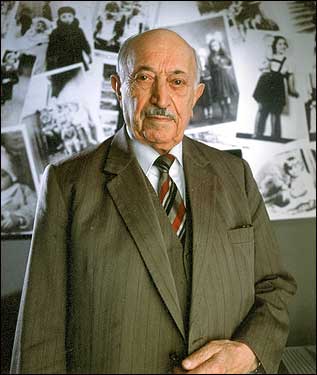 A week ago, in the class on transitional justice, Ms. Finn mentioned in passing Simon Wiesenthal (AKA the Nazi Hunter). Wiesenthal was an Austrian-Jewish architectural engineer and author. He died at the age of 96 in 2005.
A week ago, in the class on transitional justice, Ms. Finn mentioned in passing Simon Wiesenthal (AKA the Nazi Hunter). Wiesenthal was an Austrian-Jewish architectural engineer and author. He died at the age of 96 in 2005.After surviving the Holocaust, he dedicated his life to capturing fugitive Nazis so that they could be tried for war crimes and crimes against humanity. His goal, he said, was not vengeance but ensuring that Nazi crimes "are brought to light so the new generation knows about them, so it should not happen again."
Among his most famous captures is that of Karl Silberbauer, the Gestapo officer who arrested Anne Frank. Silberbauer's testimony discredited revisionist claims that The Diary of Anne Frank was a forgery.
Wiesenthal claims to have been instrumental in the capture of Adolf Eichmann, however, the Israeli Mossad (who actually captured Eichmann) say that Wiesenthal was not. Former Mossad chief Iser Harel said that Wiesenthal, "not only 'had no role whatsoever' in Eichmann's apprehension, but in fact had endangered the entire Eichmann operation and aborted the planned capture of Auschwitz doctor Josef Mengele."
Wiesenthal was certainly an upstander. Bringing perpetrators to justice in itself is amazing and his reasons for doing so is especially noble. He helped keep the spotlight on a hideous past he said too much of the world was disposed to forget.
"To young people here, I am the last," he once said, "I'm the one who can still speak. After me, it's history."
Despite suffering through the Holocaust, he emphasized that he did his work for "justice, not vengeance." How do you interpret this?
He also states that he is "not a hater." What do you think he means by this? Do you see any similarities between this statement and that of Marian Marzynski (who does not hate Germany because hate is the belief that something can't change; that progress doesn't exist)?
---
(I found this quote by Wiesenthal particularly funny. Once in Germany, someone accused him of dining on Nazis for breakfast, lunch, and dinner. Wiesenthal replied, "You are mistaken. I don't eat pork.")
1 comment:
By stating that he did his work for "justice, not vengeance", Wiesenthal claims that his work is done to bring justice to society and not let the Nazi perpatrators get away with what they did. He claims that he is not trying to punish (probably sentence to jail or execute) those who murdered the Jews, but rather have their crimes be known. When he states, "I am the last", he feels a duty of obligation to bring the Holocaust to the attention of the world today so it is not forgotten.
For some reason it's hard for me to believe that Wiesenthal did this for simply "justice, not vengenance." Being a Holocaust survivor himself, I don't understand how one of his motives for being "the Nazi Hunter" is not revenge. It seems natural to want revenge against perpatrators after an event like this.
Do you agree with me? Or is it possible for his motives to be solely based on justice? If yes, how?
Post a Comment